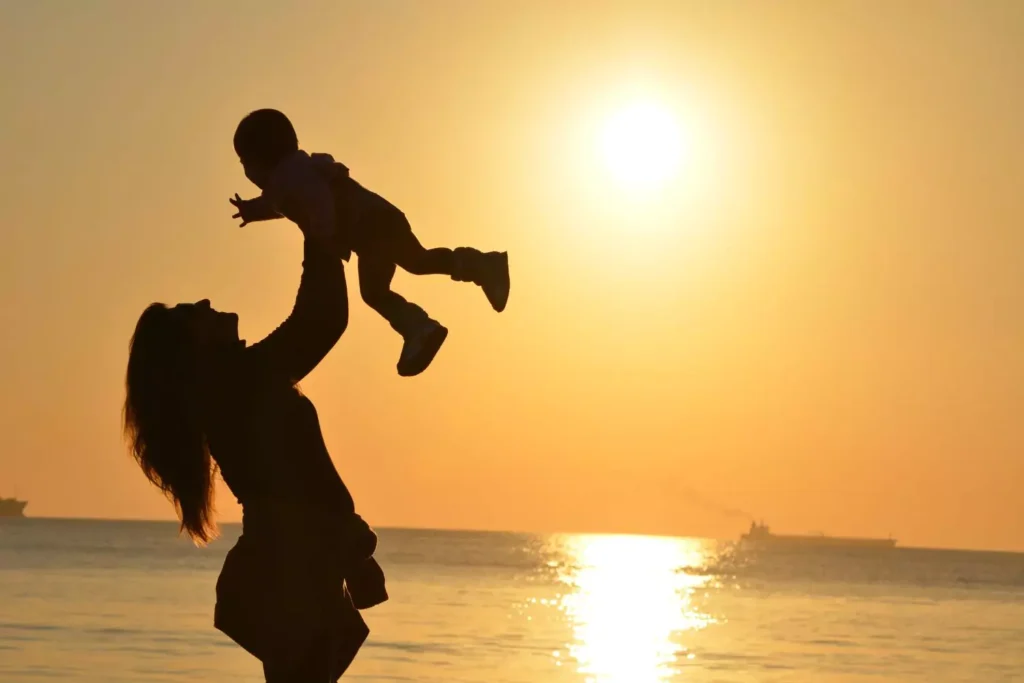Imagine adding a close friend to your social circle every two or three years. Someone unpretentious and fun, who sees the simplest activity as full of wonder. Someone who loves you freely, wholly, humbly and frankly.
This is my story growing up as the eldest of eight — especially with the youngest four, born when I was 9, 12, 13 and 17. These little ones were my living dolls, my sidekicks, my co-adventurers. Though they made me crazy sometimes (just ask the brother whom I once chased around the kitchen table), the joy was far greater.
It never occurred to me that I might not have children of my own.
Hope deferred
Even if you don’t long to parent, you’ve likely felt the ache of a hope deferred. This normal, fruitful, good thing “just happened” for your peers, but for you, it changed from a source of joyful anticipation to one of confusion, pain, or even despair.
Two years ago, 40 years old and newly dating, I entered the baby aisles in my local superstore and chose swaddling blankets for others’ newborns with the unfamiliar flutter of what had once been a casual hope: Perhaps I’ll have my own, after all. That relationship ended, so recently when I stopped to buy diapers for my sister’s children, stepping back into that department with no specific hope, the familiar ache returned. Precise and tangible, this ache lurks behind my sternum, blooming into pain at moments when my longing for children feels most real.
One word — never — has been lodged in my mind since I read Barb Best’s “Menopause and a Hope Deferred.” Now 42, I may still marry or adopt. But as I stare down the possibility of never bearing children, my own mortality feels real in a way it never has before. Usually, if a person knows they are dying, everyone else knows it too. The death of fertility, however, is silent and invisible. For me, childlessness is not a dignified grief. Voicing this desire leaves me open to the pity of others and touches topics that would normally be private between husband and wife. It underlines the lack of an identity I long expected to wear: the ordinary yet hard-won role of mother.
Often and gratefully, I recall the words of a friend: “Women are created to mother, and whether or not we have children, we will mother in a million unexpected ways.” As a sister, an aunt, a friend, a writer and a mentor, I’ve found this to be richly true. In fact, I once considered writing a love letter to my singleness because my life is crammed full of good things that aren’t babies. Still, many times a week, sometimes many times a day, I’ve been freshly aware that sorrow is standing by silently, right there at my elbow.
What went wrong?
In this grief, I’m not alone: About 1 in 5 women are childless in today’s Western world. According to British author Jody Day, the last era of comparable childlessness was that of World War I and the Great Depression, marked by the deaths of millions of men followed by worldwide poverty. Of modern not-mothers, it’s estimated that 10 percent are childless by choice and 10 percent for medical reasons, leaving 80 percent who are “childless by circumstance.” These circumstances vary greatly. Among them, Day lists:
- working off debt or caring for a family member during childbearing years
- being widowed or divorced, or simply not meeting a spouse in time
- misinformation about fertility
- inability to adopt
- realizing too late that parenthood matters to you
Economist Lyman Stone says, “Americans want to have more children than they are actually having.” The problem is not lack of desire, but “barriers to childbearing.” These include rising costs of housing and childcare, prolonged education, heavier student debt, reduced support from extended family, and steeper expectations for parents than in previous generations.
To better understand childless singles in the church, I created my own survey. Of the 29 women and men who responded, ranging in age from 21 to 64, nearly all listed their singleness as a cause of childlessness. Other factors included lack of finances, lack of support network, permanent disability, and the fear of perpetuating hurts received from a parent.
Many singles are stereotyped as immature, selfish, and ignorant of the cost of parenthood — simply because they have not experienced it. But what I saw in the lengthy answers I received was anything but selfish or ignorant. Many singles have such a deep love for children that they will engage and invest in others’ kids at work, church or in the community, though they can neither protect these children as they’d like, nor can they avoid pain when their protégées move on.
To the church
Though these singles are grateful to be invited into your family’s daily life, and the role of “fun aunt” is truly fun, there are hidden costs. When surrounded by friends discussing parenthood, they feel awkward and unable to contribute. Milestones in your children’s lives are painful reminders of what they’ve missed.
The childless often enjoy events where families are present, but then come home to the ache of an empty house. Trying to rejoice with others, some push away the grief in public, waiting to engage it until they are alone. Many have friends who are unaware that they long for a family, assuming they are childless by choice. Some friends never ask.
A number of my peers feel overlooked for ministry or in social circles at church because they aren’t part of a nuclear family. Some childless women in my survey said that when biblical family roles are preached, they are bewildered, not knowing where they fit. The closest biblical parallel to longtime singleness may be widowhood — women outside the family framework for whom God cares in a special way. In addition, Scripture passages ranging from the Great Commission to Proverbs 31 contain a robust list of options for biblical womanhood. Perhaps you can be the one at church to invite singles into an official role or remind them that ministry to individuals is still ministry to the body of Christ.
One of the greatest fears of the childless is aging and dying alone. Add to this the fact that children are God’s blessing, and some singles face a crisis of identity. Intellectually we know that we are not childless because God is angry or because we would be bad parents — but in our pain, we ask: What is wrong with me? What is wrong with God? Though Rachel, Hannah and Elizabeth felt this stigma keenly, God was always tender to those who referred their childlessness to Him.
To our brothers
Did you know that a woman in her 30s or 40s may feel invisible to her male peers in the dating world? Thanks to the imbalance between male and female biological clocks, a man can simply stop pursuing a woman his age who wants to have children right away, because younger women will be ready in the future when he is — and be willing to marry him despite his age. Likewise, he’s free to take a job that precludes children for a year or two (or more). Most men and women in my survey preferred to wait a year or two after marriage to start a family, but while he may feel the need to spend a season gaining more financial or relational stability, she’s urgently aware there might not be any children if he delays.
Grieved and upset by this dynamic, I began to research further. Are men unaware of the unique pressures women face? Are they as detached about parenthood as they often appear?
First, I learned that individual women and men arrive at, experience and express desire for children in a kaleidoscope of ways, including biological, spiritual, intellectual and relational, or in line with a societal script.
Second, while a woman is more likely to experience an actual physical ache for the weight of a baby in her arms, many men visualize their future fatherhood as a way to provide, protect, and leave a legacy. Triggering a man’s felt desire for children, however, may take a specific event such as becoming an uncle, experiencing committed love, “catching” the desire from his wife, or discovering infertility. Factors delaying this awakening could include limited contact with children, less anxiety about biological clocks, greater ability to compartmentalize, and the fact that fatherhood lies several steps ahead in his life plan.
Third, men experience their own pressures. Often, they feel a unique burden of responsibility for long-range thinking on behalf of their future family. Out of embarrassment or knowing they could be viewed as potential predators, some hesitate to discuss a yearning for children, yet childless men also experience depression and bereavement — with little to none of the same support offered to women. For a single male friend battling a chronic illness, his physical vulnerability recently exposed the depth and intensity of his longing for the children he may never have — and he burst into tears.
Because men and women are diagnosed as infertile in equal numbers, any of us may be called upon to make what feels like an impossible choice. While dating in his 20s, Michael Sobolik learned that his girlfriend, Chelsea, was born without a womb. He wrote, “I found myself wrestling with a trade-off that in no way seemed fair to me: Would I give up my dream of fathering my own biological children to be with the woman I love with all my heart?”
Michael’s “I Love Her More” is worth reading for his honesty and for the hope and the insight he found. In the end, he realized that he cared more about his future children’s likeness to Jesus than their physical likeness to him, and that his love for Chelsea went to a deeper place in his heart than the pain of giving up biological children.[i]
To 20- and 30-somethings
A lot has happened in the nine months I’ve been gestating this article. Five of my friends between 38 and 40 have delivered babies. One is rocking her firstborn after a dozen years of infertility. Their stories provide hope — and they should. But if you’re young, please don’t rely only on statistical outliers like these when you’re making a life plan.[ii] Contrary to the message of our contraceptive culture, children are not inevitable.
In my reading, I learned that:
- It can take 6-12 months for an average couple to conceive; the time increases with age
- Statistically speaking, a woman’s fertility dips at 30 and drops at 35
- A man’s fertility decreases after 40, especially considering lifestyle changes as he matures
- In vitro fertilization (IVF) is not a cure-all; it can fail as much as 75 percent of the time
There’s never a situation where we can control the outcome of our fertility — which means that every child is a gift from God. Children are neither a plague to be avoided nor angels to idealize, and they don’t exist merely to fulfill our longings. They are real people, created for God’s kingdom purposes.
How do I move ahead?
I believe that for Jesus’ followers, there’s a resurrection for every death. Should my fertility die unrealized, however, I don’t get a do-over in heaven. That realization alone took my breath away. How could I accept that what God raises from this death will be different and even better than motherhood?[iii]
I learned that the answer to my grief lies in seeing who God is, and it begins when I notice that He differs from me. Few things make that difference more vivid than when He defers or denies my deepest desires. Crashing into His perspective is like running smack into a tall and solid friend:
First there’s an “Ooph!”
Then He wraps me in His arms.
In the course of writing this article, I’ve changed. I’m more peaceful, more whole. I already hoped; now hope is replacing grief as my identity.
I learned that I feared devaluing what I grieved by accepting that there’s happiness elsewhere too. But part of the task of grief is moving into the joy of what God has given me for today — without looking down on my pain.
God had already made me fruitful and given me dignity; now I stand tall in that fact, helped by the unexpected folks He has tapped to fulfill Proverbs 31:30 for me. In the absence of husband and children to rise and call me blessed, I have still been praised as a woman who fears the LORD.
I learned that as an embodied being, I have fierce desires, compelling me to develop a fiercer faith. Like grief, living in an earth-suit limits my ability to value God’s promises to the childless, but He has provided for this limitation too. I simply prayed for insight to write this article and received far more than I expected, yet I’m only beginning to comprehend the compassion, joy and help He lavishes on us (Ephesians 1:16-20).
Here’s what I know so far: Although the knowledge of marriage and parenthood is precious and hard-won, He says to boast in another knowledge, one that’s sweeter still. Knowing God is the one identity-defining, heart-satisfying, not-to-be-missed experience of human life (Jeremiah 9:23-24; John 17:3).
In the last nine months, His kindness has freed me from fixating on my age or fears of lasting childlessness. I can admit my grief and let it bear the fruit of empathy, entering into the joys and sorrows of others because I know that God has not forgotten to write a good story for me.
Above all, I remember that this story is about God’s purposes — purposes that I may never fully understand on earth, yet they provide me a better understanding of my Savior. The world views chastity and childlessness as catastrophe, but for me, today, it’s how I know Jesus more.
__
[i] Chelsea Patterson Sobolik tells her own story in Longing for Motherhood: Holding on to Hope in the Midst of Childlessness (Moody Publishers, 2018).
[ii] Because my grandparents completed their families when they were 41 and 49, 41 and 51 respectively, I know that parenting later in life can be a wonderful providence. But when you have the choice to parent sooner, please weigh the drive to increase wisdom and wealth against the fact that childrearing later can be hard on parents and children, with the potential to decrease your energy, increase the generation gap, and shorten overlap between your lifespan and your children’s.
[iii] Matthew 22:30; 1 Corinthians 15:35-37, 42-43; Isaiah 54:1-8; 56:3-8; Mark 10:29-30
Copyright 2020 Elisabeth Adams. All rights reserved.












